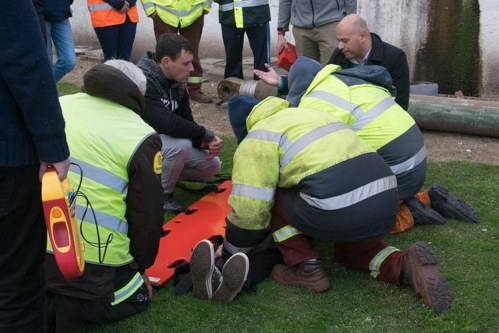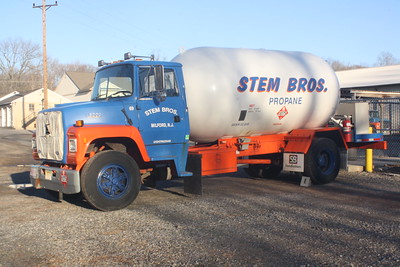
Propane is a gas that is heavier than air, so many people assume that the fumes from a propane leak will settle close to the ground. This assumption is actually true. Propane is 50% heavier than the surrounding air, it will settle to the lowest point.
Being denser, propane gas doesn’t dissipate easily but rather accumulates to the lowest point. Never light a cigarette or turn on lights where there is a propane leak. This information is significant to know by everyone because when there is a propane leak in an area, one will know what to do during this kind of situation.
To learn more how propane settles to the ground, read the rest of the article…
Basic Properties of Propane
- Molecular Weight and Its Relevance
- Propane has a molecular weight of approximately 44.1 g/mol. This factor determines how propane behaves in relation to other gases. Molecular weight plays a significant role in the relative density of gases, which in turn impacts their movement in the atmosphere.
- For practical and safety applications, understanding the molecular weight of propane can help predict its behavior during leaks or releases.
- Comparison with Air
- Air is a mixture of gases, primarily nitrogen (N2) and oxygen (O2), with an average molecular weight close to 29 g/mol.
- Due to its higher molecular weight, propane is denser than air. This means that when released, propane tends to settle near the ground unless dispersed by external forces.
- In the presence of ignition sources, this property makes propane particularly hazardous, especially in enclosed areas where it can accumulate.
Behavior of Propane Fumes
- Initial Release: Dispersion Dynamics
- Upon immediate release, propane will expel rapidly, seeking to occupy a larger volume. Its denser nature will cause it to flow downwards and spread along surfaces.
- If the release is forceful, the initial velocity might cause it to mix somewhat with the surrounding air, but it will eventually settle.
- Long-term Behavior and Factors Influencing It
- Over time, propane fumes will continue to pool in lower areas unless dispersed or diluted by other forces.
- While evaporation is not a concern (as propane is already in a gaseous state at room temperature), diffusion with ambient air will occur slowly, reducing concentration gradients.
- If left undisturbed, propane can remain in low-lying areas for extended periods, posing a prolonged risk.
Factors Affecting Propane Fume Movement
- Temperature: How It Impacts the Density of Propane
- As temperature rises, propane, like all gases, expands and its density decreases. This might cause it to rise slightly, but it will still generally remain denser than air.
- Conversely, in colder conditions, propane’s density increases, making it settle more aggressively.
- Wind and Airflow: Effects on Dispersion
- Wind or any form of airflow can disperse propane, reducing its concentration in a particular area. Effective ventilation, especially in low-lying areas, can prevent dangerous accumulation.
- In outdoor settings, even mild winds can significantly aid in the rapid dispersion of propane.
- Containment: Influence of Surrounding Structures or Obstacles
- Enclosed spaces or areas surrounded by obstacles can trap propane, preventing its dispersion.
- Trenches, basements, and other below-ground spaces are particularly risky as they can act as reservoirs for accumulating propane.
- It’s crucial for areas storing propane to have adequate ventilation and regular monitoring to ensure safety.
Knowing these properties and behaviors of propane is essential for its safe handling and use, especially in residential and industrial settings where leaks or releases might occur.
Safety Implications
- Potential Risks Associated with Propane Fume Accumulation
- Asphyxiation Risk: In high concentrations, propane can displace oxygen in an enclosed space, leading to asphyxiation.
- Explosion and Fire Hazard: Propane is highly flammable. When it accumulates and mixes with air in the right proportions, it can form an explosive mixture. Any ignition source, like a spark or flame, can trigger an explosion or fire.
- Cold Burns and Frostbite: Liquid propane can cause cold burns or frostbite upon contact with the skin, as it vaporizes quickly and cools rapidly.
- How Understanding the Movement Can Aid in Safer Storage and Usage
- Knowing that propane is denser than air and tends to settle can guide the placement of sensors or alarms in low-lying areas.
- Awareness of propane’s behavior can lead to the design of better-ventilated storage areas, minimizing the risk of accumulation.
- Proper storage practices, including regular inspection for leaks and ensuring containers are in good condition, can prevent unintended releases.
Practical Applications
- How Understanding This Behavior Benefits Propane Users
- By understanding how propane behaves, users can make informed decisions about where to store propane tanks, how to detect leaks early, and how to respond in case of a leak.
- Users can also better design their spaces, especially in industrial settings, to prevent propane accumulation and ensure safer work environments.
- Applications in Industries and Households
- Industries: In sectors like manufacturing, agriculture, and food production, propane is commonly used as a fuel. Proper storage and understanding of propane’s behavior can prevent industrial accidents.
- Households: Many households use propane for heating, cooking, and powering certain appliances. Knowing its behavior helps homeowners ensure their homes are safe, especially basements or other low-lying areas where propane might accumulate if there’s a leak.
What to do when there’s a leak
Propane fumes are heavier than air and will settle in low-lying areas. If you suspect a propane leak, open all doors and windows to ventilate the area to get the gas out, and leave immediately. Do not turn on any lights or electrical appliances, which could ignite the fumes. If you can hear a hissing sound, this means there is a very serious leak. Call the fire department immediately.
There are several ways to tell if there is a propane leak:
• You may smell a “rotten egg” smell. This is the smell of propane gas.
• You may hear a hissing or whistling noise coming from the propane tank or appliance.
• You may see a white cloud or fog near the propane tank or appliance.
• If you have a propane-powered vehicle, the engine may run differently than usual.
If you think there is a propane leak, do not attempt to fix it yourself. Only a certified propane technician should fix a propane leak.
What to do if you smell propane
If you smell propane, it is important to take immediate action. Propane is a highly flammable gas, and even a small spark can ignite it. If you are outdoors, quickly move away from the area where you smelled the propane. If you are indoors, open all the doors and windows to ventilate the area, then leave immediately.
Do not turn on any lights, appliances, or phones, as these could create a spark that ignites the gas. If you can, shut off the propane supply at the tank or at the appliance. Once you are safely away from the area, call the fire department or your propane supplier.
How to prevent propane leak
Assuming you would like tips on how to prevent propane leaks:
One way to prevent propane leaks is to make sure that all connections are tight. Check hoses, pipes and fittings for any leaks. If you find a leak, turn off the propane immediately and do not use it until the leak is fixed.
Another way to prevent propane leaks is to keep the area around your propane tank clean. This will help you spot leaks more easily. If you have a leak, clean up the area immediately to prevent any accidents.
Finally, it is important to have your propane tank inspected regularly. This will help you catch any leaks before they become a problem.
How to safely use propane
Propane is a gas at room temperature and pressure. It is odorless and colorless. Propane is used in a variety of applications, including BBQ grills, heaters, and stoves. Propane is flammable and can be explosive if not used properly.
To safely use propane, always follow the manufacturer’s instructions. When using propane outdoors, make sure there is plenty of ventilation. Propane should never be used indoors. If you smell propane, open all the doors and windows and leave the area immediately.
If you think there may be a propane leak, do not attempt to repair it yourself. Call a qualified technician to fix the leak.
Is propane gas toxic?
The toxicity of propane gas is a topic of some debate. Some sources claim that it is toxic, while others maintain that it is safe to use. This section of the article will explore the toxicity of propane gas and provide some safety tips for using it.
There is no definitive answer to the question of whether or not propane gas is toxic. Some sources, claim that propane is not toxic. However, other sources have classified propane as a toxic substance. It could be toxic when inhaled if the gas is inhaled in large quantities.
The main concern with propane gas is its flammability. If propane gas is inhaled, it can cause asphyxiation. Inhaling large amounts of propane can also lead to chemical pneumonitis, a condition that causes inflammation of the lungs.
Propane gas is also a risk for explosion. If a propane tank is not properly ventilated, the gas can build up and cause an explosion.
To avoid these risks, it is important to take some safety precautions when using propane gas. Make sure to read all the instructions that come with your propane tank. If you are using a propane-powered appliance, make sure that the room is well-ventilated. And, if you are transporting a propane tank, make sure that it is properly secured so that it cannot tip over.
Conclusion
Propane fumes, due to their denser nature compared to air, tend to fall and settle in low areas. Recognizing this behavior is crucial for safety, especially in areas where propane is stored or used. Making informed decisions based on this knowledge can help prevent potential hazards and ensure safer environments.
Awareness of propane’s propensity to gather in low-lying areas is particularly important for homeowners, industries, and emergency responders. Proper ventilation, regular inspections, and strategic placement of sensors can effectively mitigate risks associated with unnoticed accumulations. In essence, a simple understanding of whether propane fumes rise or fall can be the key to preventing potentially catastrophic incidents. As with many things, knowledge is our first line of defense in ensuring safety and effective use of this common fuel source.

Mike is an experienced propane technician with over 15 years of professional experience in the field. He has dedicated his career to helping customers with their propane needs, from installation to maintenance and repair. Together with Jeremy, he co-founded this website to provide useful information and guidance to customers seeking reliable propane services.



